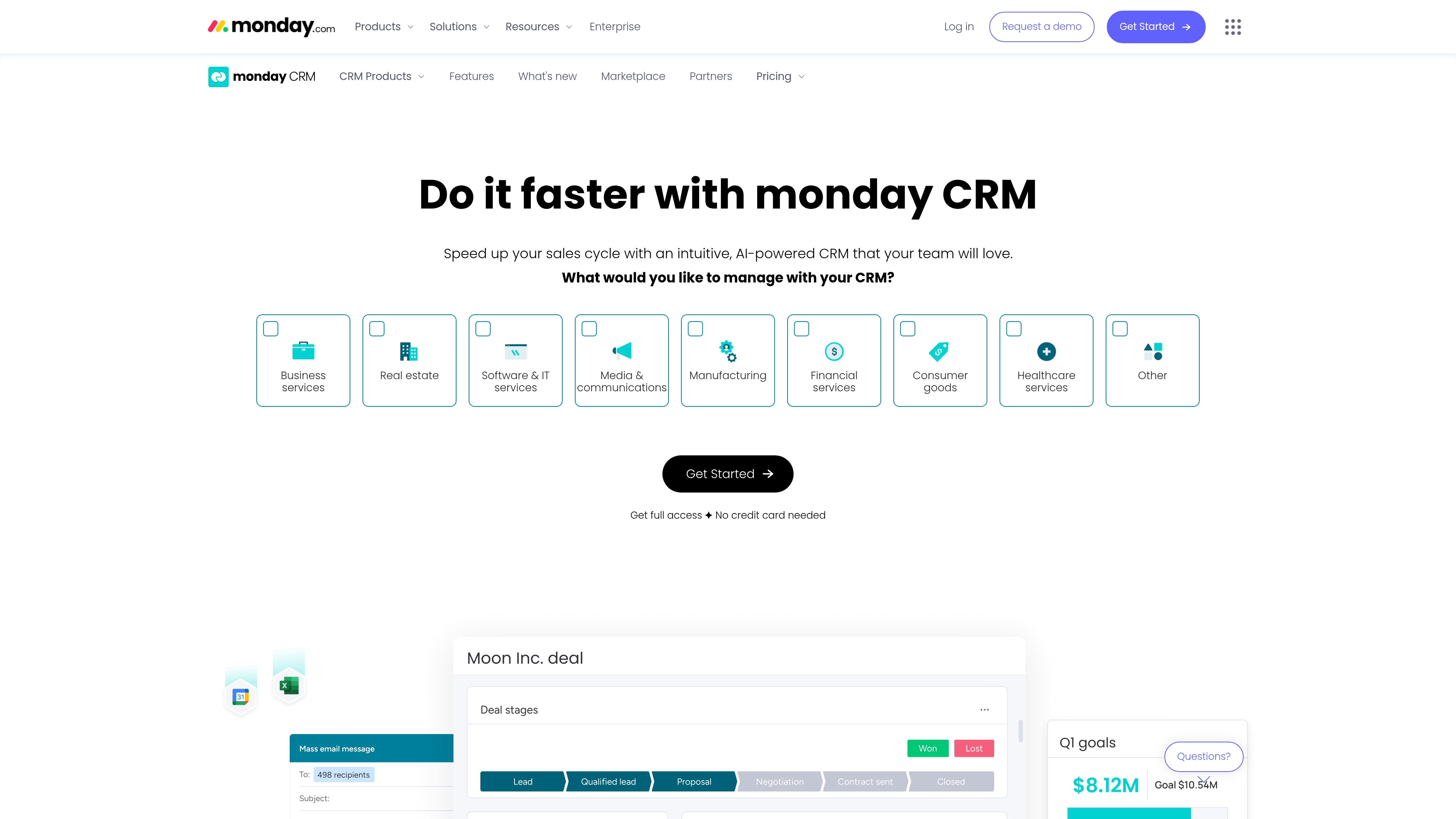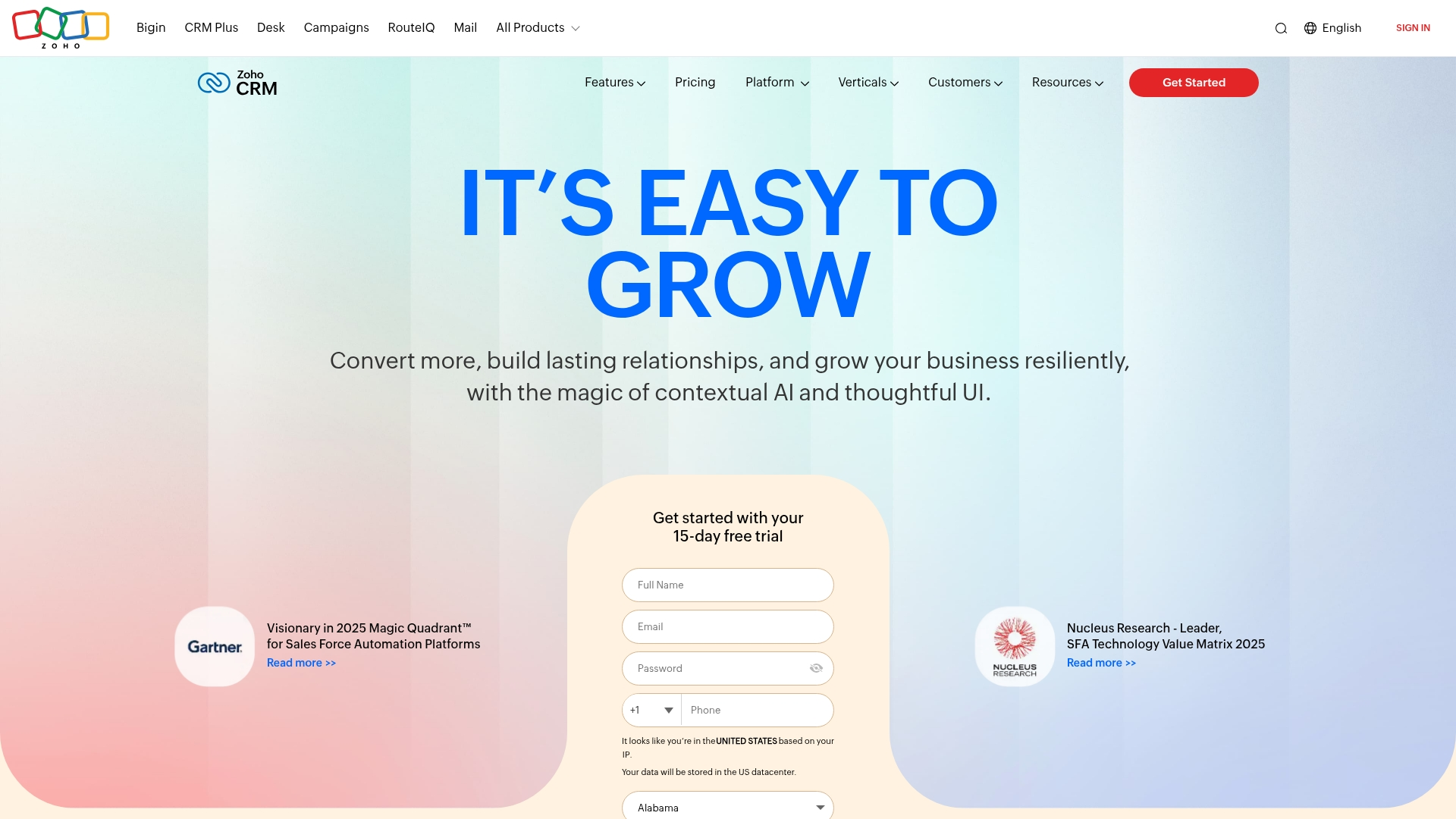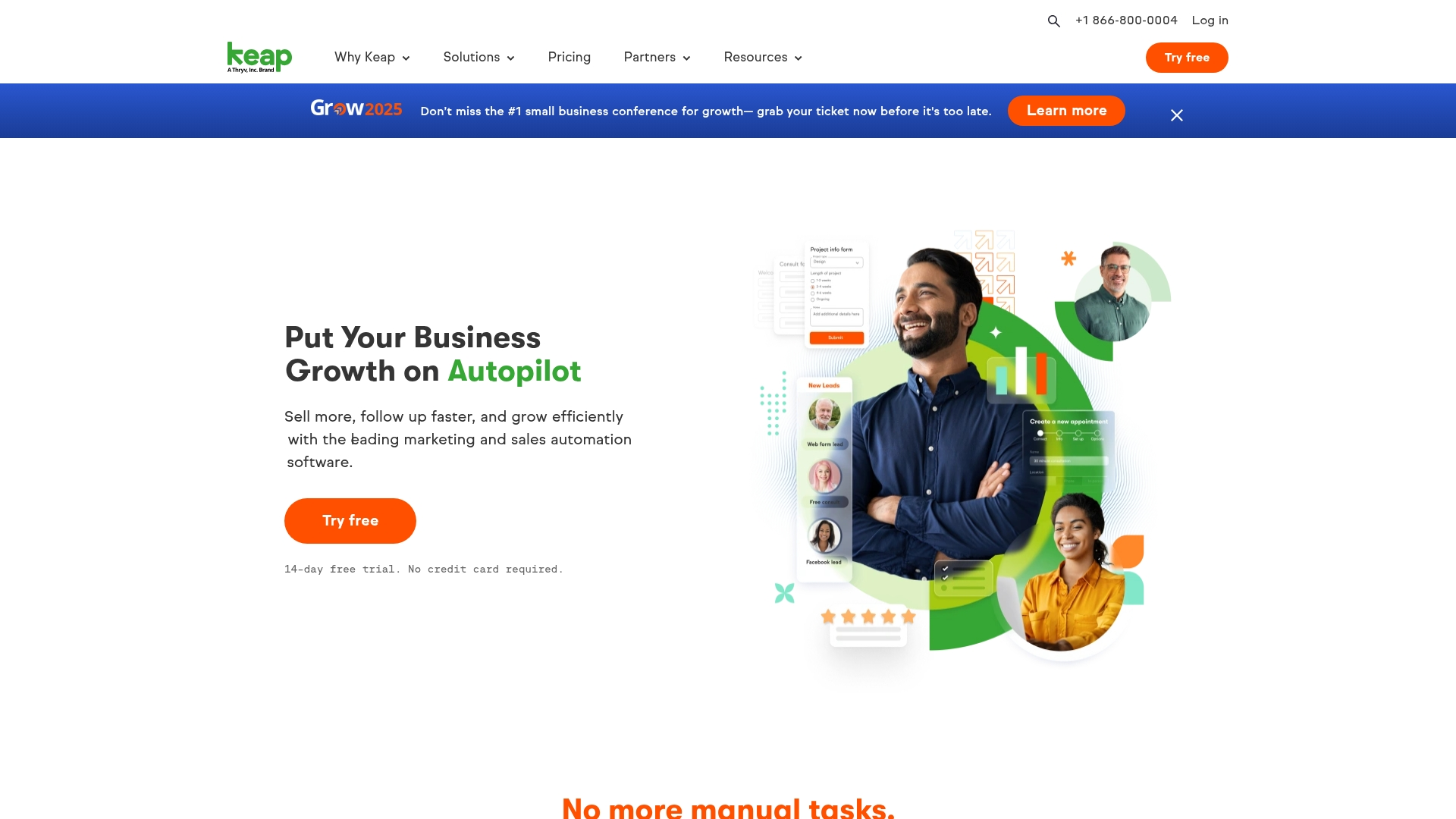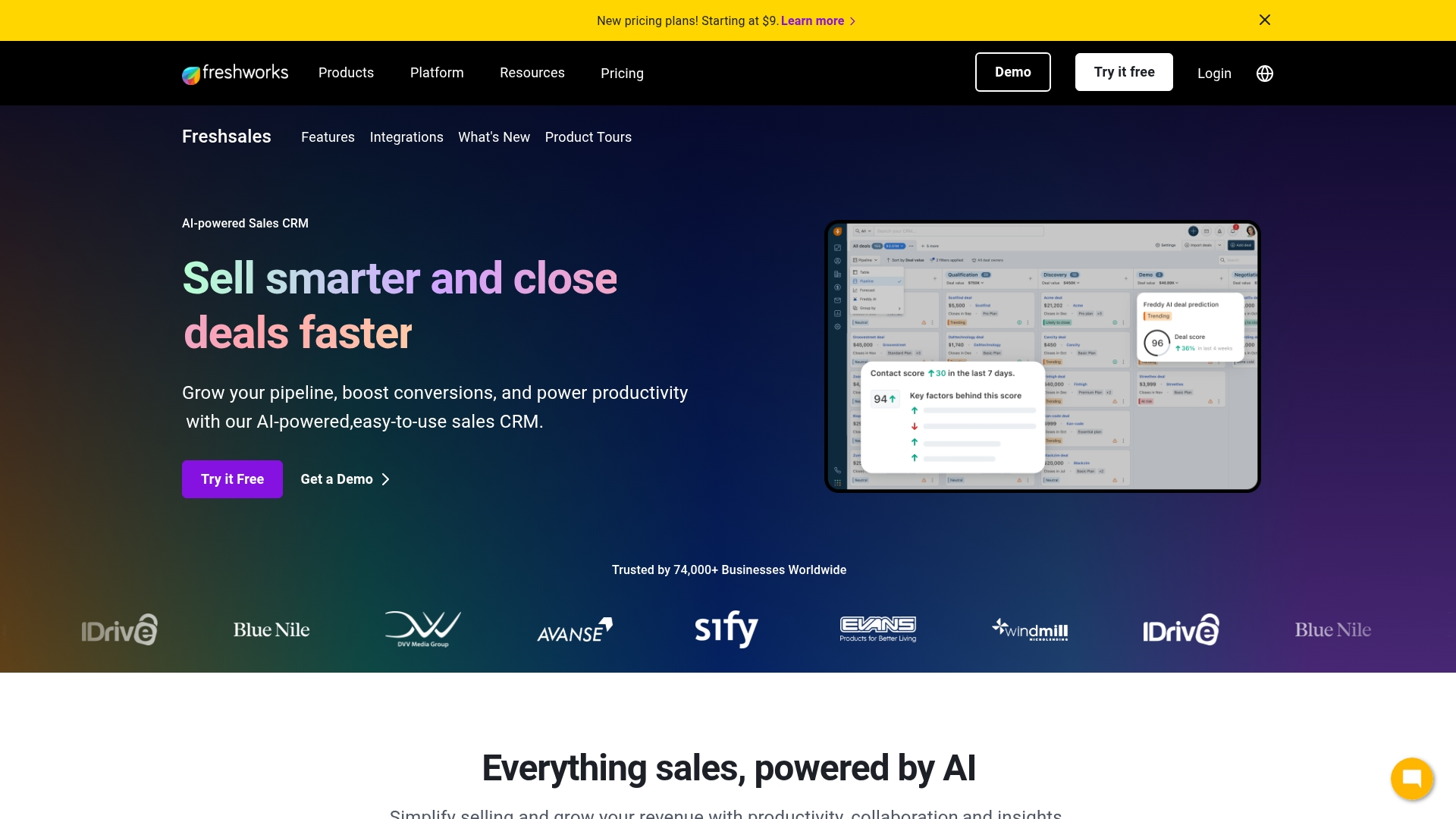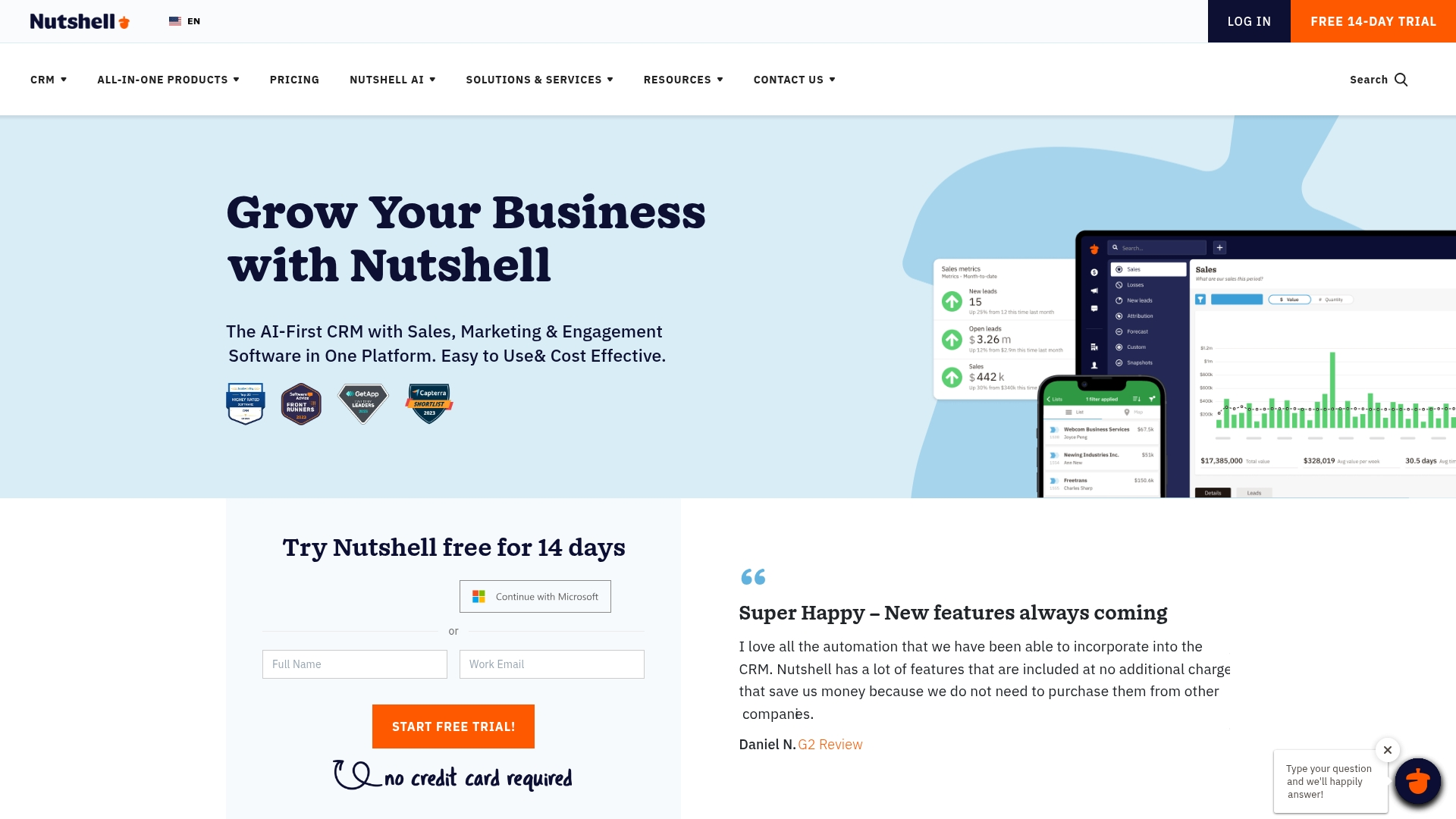Your reps are drowning in data while hot leads go cold. Every minute spent on manual data entry is a minute stolen from actual selling… and it’s costing you deals. The right lead management software eliminates the busywork that’s killing your team’s momentum, so every rep can focus their energy on the opportunities that are ready to close. And, a flexible platform like monday CRM transforms that chaos into a streamlined revenue engine.
This guide breaks down the 10 best lead management solutions built to solve real sales challenges. We’ll show you their key features, pricing, and what actually makes them worth your time, so you can choose the platform that gets your team back to selling.
What is lead management software
Think of lead management software as your team’s central playbook, a single digital workspace that captures every potential customer and provides a clear path for turning their interest into a closed deal. It’s how we trade the chaos of scattered notes and overflowing inboxes for a system that ensures every opportunity is captured and tracked.
At its best, this software automates the repetitive data entry and follow-ups that bog teams down, helping you with closing deals instead of administrative tasks.
With a platform like monday CRM, we give everyone the visibility to prioritize the hottest leads and the control to know exactly what step to take next. It’s about making your entire sales process faster, smarter, and more aligned.

Key benefits of lead management systems
Automate busywork and capture every opportunity
Free your team from the weeds of manual data entry and empower them to build relationships that close deals. A strong lead management system handles the repetitive tasks, capturing every email, call, and interaction without anyone lifting a finger. You’re instilling confidence that no opportunity will ever get lost again.
Focus energy on high-converting prospects
Top performers should be closing deals, not chasing down dead ends. With intelligent scoring, you can automatically surface the hottest leads most likely to convert, ensuring your team’s energy is directed where it will have the biggest impact. It’s like giving every salesperson a playbook that points them directly to the winning deals.
Gain real-time visibility across your pipeline
Exceptional teams require an exceptional scoreboard, which is exactly what a unified platform provides. Instant dashboards offer a complete, honest look at every deal in motion, transforming forecasting from a guess into a science. This level of visibility aligns everyone and gives leadership the control to make smart plays and the team the clarity to hit their goals.
Align your team with a single source of truth
When everyone works from the same data, collaboration becomes seamless and decision-making accelerates. A centralized system eliminates confusion, reduces duplicate efforts, and ensures marketing and sales stay perfectly synchronized throughout the customer journey.
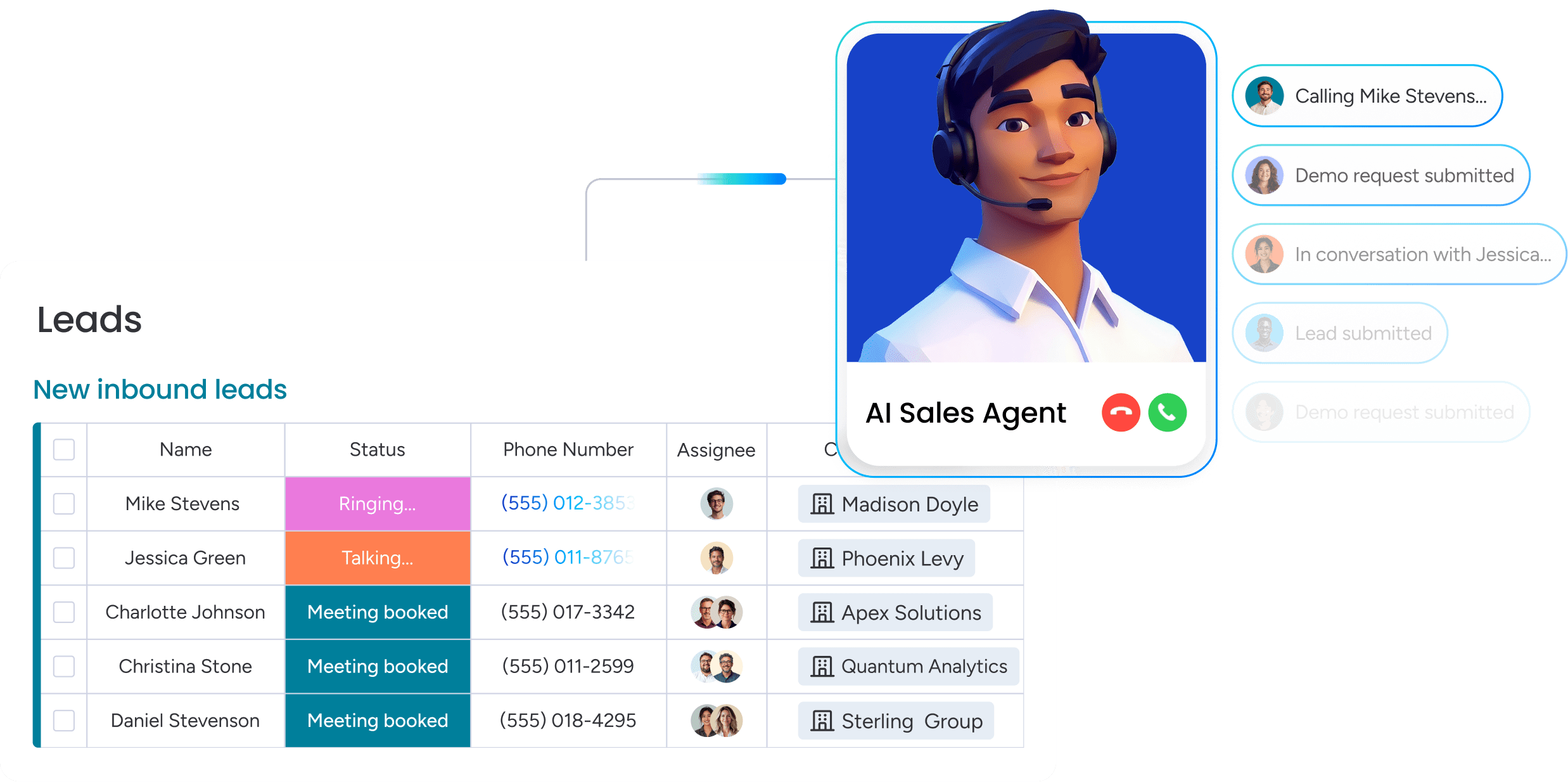
10 best lead management solutions to accelerate your sales
The right lead management system isn’t just another task on the to-do list; it’s a game-changing decision for your entire sales team. The best platforms adapt to your actual selling process, turning it into your competitive edge.
A great solution gives your team true superpowers. It can help you with getting a crystal-clear view of your pipeline and having the confidence to know exactly which deals to focus on to crush your targets. And this is how to build an unstoppable business.
Below, you’ll find the best lead management solutions to test and implement.
1. monday CRM
monday CRM transforms lead management from a scattered, reactive process into a streamlined revenue engine that actually works for your team. Built on the flexible monday.com Work OS, it eliminates the technical barriers that make other CRMs feel like a second job, giving you powerful capabilities without the enterprise-level headaches.
Example:
monday CRM centralizes lead capture, tracking, and nurturing in one visual workspace, helping sales teams convert more prospects while spending less time on administrative work.
Key features:
- Visual sales pipeline: Track deals through custom stages with drag-and-drop functionality.
- Built-in email integration with template support and AI-assisted composition
- Centralized lead and contact management to keep all your data in one place
Pricing:
- Free: $0 for up to 2 seats (general Work OS plan with limited features)
- Basic: $9/month per seat (billed annually)
- Standard: $12/month per seat (billed annually)
- Pro: $19/month per seat (billed annually)
- Enterprise: Contact sales for custom pricing
- Paid plans require a 3-user minimum. While a free Work OS plan exists, there is no free CRM-specific plan.
Why it stands out:
- Intuitive visual interface that requires minimal training, getting teams productive from day one.
- Flexible Work OS foundation allows complete customization of lead management workflows without technical expertise.
- Seamless integration with project management and other business processes on the same platform.
Advanced AI features:
- AI-assisted email composition helps draft personalized outreach messages (trial credits included in paid plans).
- Intelligent lead scoring automatically prioritizes prospects based on criteria like title, company size, and license interest (Enterprise plan only).
Automations:
- No-code automation builder with 250+ pre-built recipes for lead assignment, status updates, and follow-up reminders.
- Automation limits scale with your plan, from 250 actions/month (Standard) and 25,000 actions/month (Pro) up to 250,000 actions/month (Enterprise).
- Cross-board automation that automatically converts qualified leads to contacts and creates deals in your sales pipeline.
Integrations:
- Connects with essential tools like Gmail, Outlook, Facebook Ads, HubSpot, and Salesforce.
- Access 200+ other business apps, with some integrations requiring third-party connectors.
- Integration with WorkForms by monday.com for seamless lead capture from websites and landing pages.
Lead management software features:
- Centralized leads board with automatic duplicate detection and data enrichment (Standard plan and up).
- Multi-channel lead capture through forms, imports, and direct integrations with marketing platforms.
- Real-time dashboards and lead analytics providing insights into lead conversion rates, regional performance, and qualification status.
2. HubSpot
HubSpot’s lead management software combines powerful automation with an intuitive interface to transform how businesses capture, nurture, and convert prospects. The platform works well for growing companies aiming to scale sales operations without added complexity.
Use case:
HubSpot’s all-in-one platform centralizes lead data and automates nurturing workflows, helping sales teams prioritize high-value prospects and close deals faster through intelligent scoring and seamless handoffs between marketing and sales.
Key features:
- Smart lead scoring and routing: Automatically prioritizes leads using AI-powered scoring and assigns them to the right sales reps based on custom criteria.
- Unified customer timeline: Tracks every interaction across email, website visits, and social media in one centralized view for complete lead visibility.
- Automated nurturing workflows: Creates personalized email sequences and content delivery that guides leads through the sales funnel without manual intervention.
Pricing:
- Free CRM: A generous free plan is available with essential lead management features.
- Paid Tiers (Starter, Professional, Enterprise): Paid plans unlock progressively advanced features, including automation, custom workflows, and predictive lead scoring. For the most current pricing, it’s best to consult HubSpot’s official website.
Considerations:
- Advanced features like predictive lead scoring are locked behind expensive enterprise tiers, making the platform costly as your contact database grows.
- Some users report data duplication issues and the need for regular database maintenance to keep lead records clean.
3. Salesforce
For large organizations with sophisticated sales operations and diverse team structures, Salesforce provides enterprise-grade lead management through its comprehensive CRM platform. The system specializes in deep customization and AI-powered insights, making it a powerful choice for handling complex sales processes at scale.
Use case:
Salesforce transforms lead management into a structured, data-driven process that captures prospects from multiple channels, qualifies them through AI-powered scoring, and nurtures them until conversion into revenue-generating opportunities.
Key features:
- Einstein AI lead scoring: Automatically prioritizes leads based on conversion likelihood and engagement patterns.
- Automated lead routing: Distributes qualified leads to appropriate sales teams based on geography, industry, or product interest.
- Comprehensive lead nurturing: Maintains prospect relationships through personalized campaigns and multi-channel communication.
Pricing:
Salesforce offers several pricing tiers designed to scale with your business needs. For the most current pricing, we recommend checking their official website, as rates can vary.
- Plans include: Starter, Professional, Enterprise, and Unlimited.
- Advanced AI features and automation capabilities typically require Enterprise or Unlimited editions.
Considerations:
- Steep learning curve: The platform’s extensive customization options can overwhelm new users and require a significant training investment.
- High total cost: Beyond base pricing, additional costs for integrations, customizations, and premium features can quickly escalate, especially for smaller teams.
4. Zoho CRM
Operating within an affordable, all-in-one business ecosystem, Zoho CRM offers comprehensive lead management for over 250,000 businesses. The platform specializes in AI-powered automation and deep customization, making it ideal for small to midsize businesses seeking enterprise-grade features without the premium price tag. Its seamless integration across 50+ business applications transforms how teams capture, nurture, and convert prospects.
Use case:
Zoho CRM excels at helping growing businesses capture leads from multiple channels, automatically score and distribute them to sales reps, and nurture prospects through personalized workflows — all while maintaining data quality and regulatory compliance.
Key features:
- Multi-channel lead capture: Automatically gather prospects from websites, social media, live chat, and offline sources like trade shows through integrated webforms and card scanning apps.
- AI-powered lead scoring and routing: Zia AI assistant intelligently scores leads based on engagement and demographics, then automatically assigns them to the right sales reps using customizable rules.
- Automated nurturing workflows: Create sequential follow-up campaigns with Cadences, trigger personalized emails based on prospect behavior, and maintain consistent engagement across all touchpoints.
Pricing:
- Free: $0 for up to 3 users with essential features like leads, documents, and mobile apps.
- Standard: $14/user/month (billed annually) with mass email, workflows, sales forecasting, and Office 365 integration.
- Professional: $23/user/month (billed annually) adding Blueprint processes, SalesSignals, inventory management, and Google Ads integration.
- Enterprise: $40/user/month (billed annually) including Zia AI assistant, territory management, journey orchestration, and advanced customization.
- Ultimate: $52/user/month (billed annually) with enhanced AI/ML platform, augmented analytics, and unified business insights.
- Team User Add-on: $9/team user/month for non-sales users with limited access.
- Monthly billing available with yearly billing saving up to 34%.
Considerations:
- The extensive customization options and 50+ integrated applications can create a steep learning curve for new users, potentially requiring significant training time.
- Customer support quality varies by pricing tier, with some users on lower-tier plans reporting slower response times and limited assistance.
5. Pipedrive
Designed by salespeople for sales teams, Pipedrive provides a highly visual approach to sales pipeline management. The platform’s strength lies in its drag-and-drop deal tracking and activity-based selling methodology, making it an excellent choice for small to medium-sized businesses that want to get up and running quickly without extensive training.
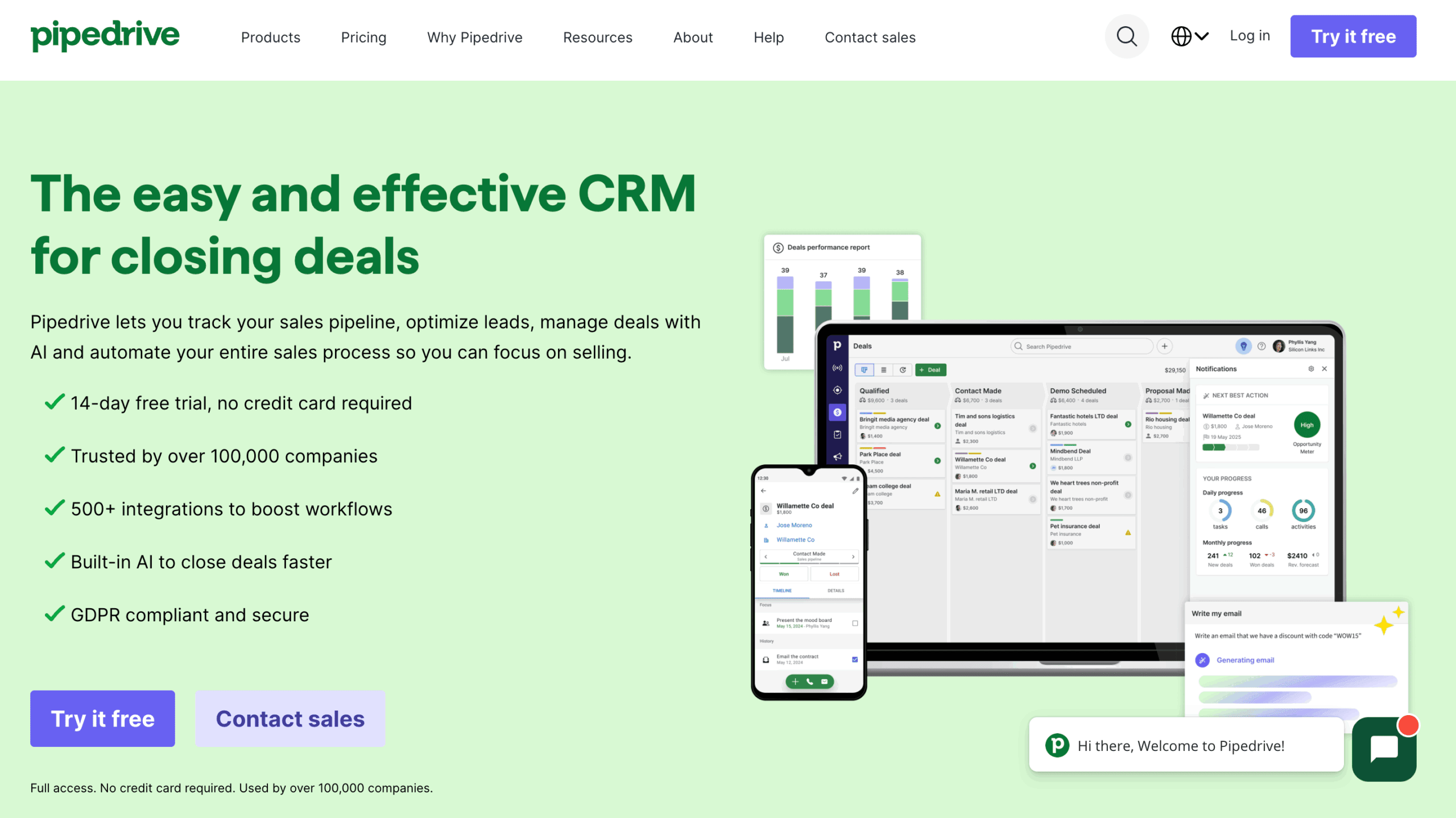
Use case:
According to a 2023 Pipedrive customer success report, sales teams increase pipeline deals by an average of 93% after adoption through its intuitive visual interface and comprehensive lead nurturing capabilities.
Key features:
- Leads Inbox: Centralized storage for incoming leads with filtering, sorting, and automated activity assignment to prevent prospects from going cold.
- LeadBooster add-on: 4-in-1 lead generation bundle including chatbot, live chat, web forms, and prospector tools for finding high-quality leads.
- AI Sales Prospecting: Beta feature that provides AI-powered lead ranking, scoring, and next best action suggestions to prioritize prospects.
Pricing:
- Lite: $14/month per user (billed annually)
- Growth: $39/month per user (billed annually)
- Premium: $59/month per user (billed annually)
- Ultimate: $79/month per user (billed annually)
- All plans include a 14-day free trial
- Add-ons available starting from $6.67 to $41 per company
Considerations:
- Lower-priced plans have limited reporting and analytics capabilities that may be insufficient for businesses requiring deep lead insights.
- Add-on cost structure can significantly increase total ownership costs, with powerful features like LeadBooster not included in core plans.
6. Keap
As an all-in-one CRM and marketing automation platform, Keap is engineered specifically for small businesses. The platform excels at combining lead management with automated follow-ups and payment processing, making it a strong fit for service-based businesses that need to streamline their entire customer journey. With over 200,000 users worldwide, Keap is a go-to solution for entrepreneurs who want to automate sales processes without losing a personal touch.
Use case:
Keap helps small businesses capture, nurture, and convert leads through automated workflows while managing the entire customer lifecycle from initial contact to payment processing.
Key features:
- Visual automation builder: Create complex
when-thenworkflows without coding knowledge to nurture leads automatically - Lead scoring and segmentation: Automatically prioritize hot prospects and categorize leads based on behavior and demographics
- Integrated appointment scheduling: Built-in calendar system with automated reminders and follow-up sequences
Pricing:
- Pro plan: $299/month (includes up to 50,000 contacts and 2 user licenses)
- Additional users: $39/month per user
- Text marketing tiers: Range from $24/month (1,000 messages) to $279/month (25,000 messages)
- Implementation services: Required and sold separately with pricing varying by package
Considerations:
- High upfront cost with mandatory implementation fees can be prohibitive for very small businesses or startups
- Steep learning curve due to the platform’s comprehensive feature set, which may overwhelm users new to CRM systems
7. EngageBay
Built for small businesses and startups, EngageBay offers an all-in-one marketing, sales, and customer service platform. It combines comprehensive lead management with marketing automation at a fraction of the cost of enterprise solutions, making it perfect for growing teams that need powerful features without breaking the budget.
Use case:
EngageBay helps small businesses manage their entire customer journey from lead capture to conversion with unified marketing, sales, and support tools in one affordable platform.
Key features:
- Automated lead scoring and qualification: Predictive scoring helps prioritize high-value prospects automatically
- Visual pipeline management: Track deals through customizable stages with drag-and-drop simplicity
- Integrated marketing automation: Create email sequences, web forms, and landing pages without switching platforms
Pricing:
- Free: $0/month for up to 250 contacts
- Basic: $13.79/month per user (yearly billing) for 500 contacts
- Growth: $59.79/month per user (yearly billing) for 5,000 contacts
- Pro: $110.39/month per user (yearly billing) for 50,000 contacts
- All plans include marketing, CRM, and service features with increasing capabilities
- Free migration service from any other platform included
Considerations:
- Limited native integrations compared to larger platforms, though Zapier connectivity helps bridge gaps
- Language support currently limited to English only, which may restrict international teams
8. Freshsales
With its built-in communication tools, Freshsales provides AI-powered lead management that keeps sales teams connected and productive. The platform specializes in automated lead scoring and multichannel engagement, making it ideal for growing businesses that need to prioritize prospects and streamline their sales process. Its intuitive interface and comprehensive automation features help teams focus on high-value activities rather than manual tasks.
Use case:
Freshsales empowers sales teams to capture, score, and nurture leads automatically while providing AI-driven insights to prioritize the most promising prospects.
Key features:
- AI-powered lead scoring: Freddy AI ranks leads based on engagement and conversion likelihood, helping teams focus on high-potential prospects
- Built-in communication hub: Phone, email, SMS, chat, and WhatsApp integration enables multichannel engagement from a single platform
- Automated sales sequences: Time-based and behavior-triggered workflows streamline follow-ups and nurture campaigns
Pricing:
- Free: $0 for up to 3 users with basic features
- Growth: $15/user/month (billed annually) with contact lifecycle stages and basic workflows
- Pro: $39/user/month (billed annually) with AI insights and advanced automation
- Enterprise: $69/user/month (billed annually) with field-level permissions and forecasting
- 21-day free trial available with no credit card required
Considerations:
- Limited third-party integrations compared to competitors like HubSpot may restrict workflow flexibility
- Customer support response times can be slower than expected, particularly for complex technical issues
9. Nutshell
Designed to help B2B sales teams streamline lead management without complexity, Nutshell offers an all-in-one CRM and email marketing platform. It specializes in user-friendly pipeline management with built-in sales methodology, making it ideal for small to medium-sized teams who want powerful automation without hiring a dedicated CRM administrator.
Use case:
Nutshell helps B2B sales teams centralize lead tracking, automate follow-up sequences, and visualize their sales pipeline through multiple customizable views while maintaining simplicity and ease of use.
Key features:
- Custom pipeline creation with industry-specific starter packs. Note: Multiple pipelines and AI-powered design assistance are available on Pro plans and above.
- Multiple visualization options including a drag-and-drop board view, list view, chart view for trend analysis, and a map view that’s perfect for territory management and outside sales teams.
- Hot leads prioritization that automatically surfaces high-priority prospects. Note: This feature is available on the Growth plan and above.
Pricing:
Pricing for Sales plans is per user, per month.
- Foundation: $13 (annual) or $19 (monthly)
- Growth: $25 (annual) or $32 (monthly)
- Pro: $42 (annual) or $49 (monthly)
- Business: $59 (annual) or $67 (monthly)
- Enterprise: $79 (annual) or $89 (monthly)
Add-ons require an active Sales subscription and include Marketing Suite Pro ($49/company/month), Quotes & Invoices ($67/month), Nutshell IQ ($37/month), and more.
Considerations:
- Limited customization options for reporting compared to more advanced CRM platforms.
- Some users report occasional performance issues with data uploading and system speed.
10. Copper
For teams that live in Google Workspace, Copper offers a CRM solution built to manage leads without ever leaving the inbox. The platform’s deep, seamless Gmail integration and automated data capture make it a perfect fit for small to medium-sized businesses that rely on Google’s ecosystem.
Use case:
Copper serves as the only Google-recommended CRM, enabling relationship-focused businesses to capture, track, and nurture leads directly within their existing Google Workspace environment.
Key features:
- Native Gmail integration: Manage leads and view contact history without switching between platforms.
- Automated data capture: Automatically suggests contacts from email interactions and enriches profiles with available public information.
- Visual pipeline management: Track deals with a drag-and-drop interface and customizable stages.
- Project management tools: Manage tasks and projects alongside your sales pipeline.
- Workflow automation: Automate repetitive tasks and streamline processes (available in higher-tier plans).
Pricing:
All plans are billed per user, per month. Annual billing offers up to a 26% discount.
- Starter: $9/user/month (billed annually) or $12/month. Includes Google Workspace integration, Zapier integration, and a 1,000 contact limit.
- Basic: $23/user/month (billed annually) or $29/month. Adds task automation, multiple pipelines, and project management. Limited to 3 users and a 2,500 contact limit.
- Professional: $59/user/month (billed annually) or $69/month. Adds workflow automation, AI-powered insights, and a 15,000 contact limit.
- Business: $99/user/month (billed annually) or $134/month. Includes unlimited contacts and advanced features.
Considerations:
- Limited functionality for teams not using Google Workspace extensively.
- The Basic plan is capped at three users, which may be a constraint for growing teams.
- Advanced features like workflow automation and AI-powered insights are only available in higher-tier plans.
Must-have features in lead management software
Instead of getting lost in a sea of flashy features, it’s crucial to focus on what a sales team actually needs to win. The right tools should feel like a superpower, not another chore on the to-do list. We’ve identified four key features:
- Intelligent lead scoring. A great platform instantly shows which leads are hottest, allowing energy to be poured into conversations that are ready to happen.
- Workflow automation. By putting repetitive tasks like follow-up emails and reminders on autopilot, you free up your team to do what they do best: build relationships and close deals.
- Real-time pipeline visibility. True visibility means everyone sees the same clear picture, from marketing campaign effectiveness to the precise stage of every deal in the pipeline.
- Seamless integrations and mobile access. When tools connect seamlessly and are accessible from anywhere, the entire team stays aligned and can make confident, data-backed decisions on the fly.
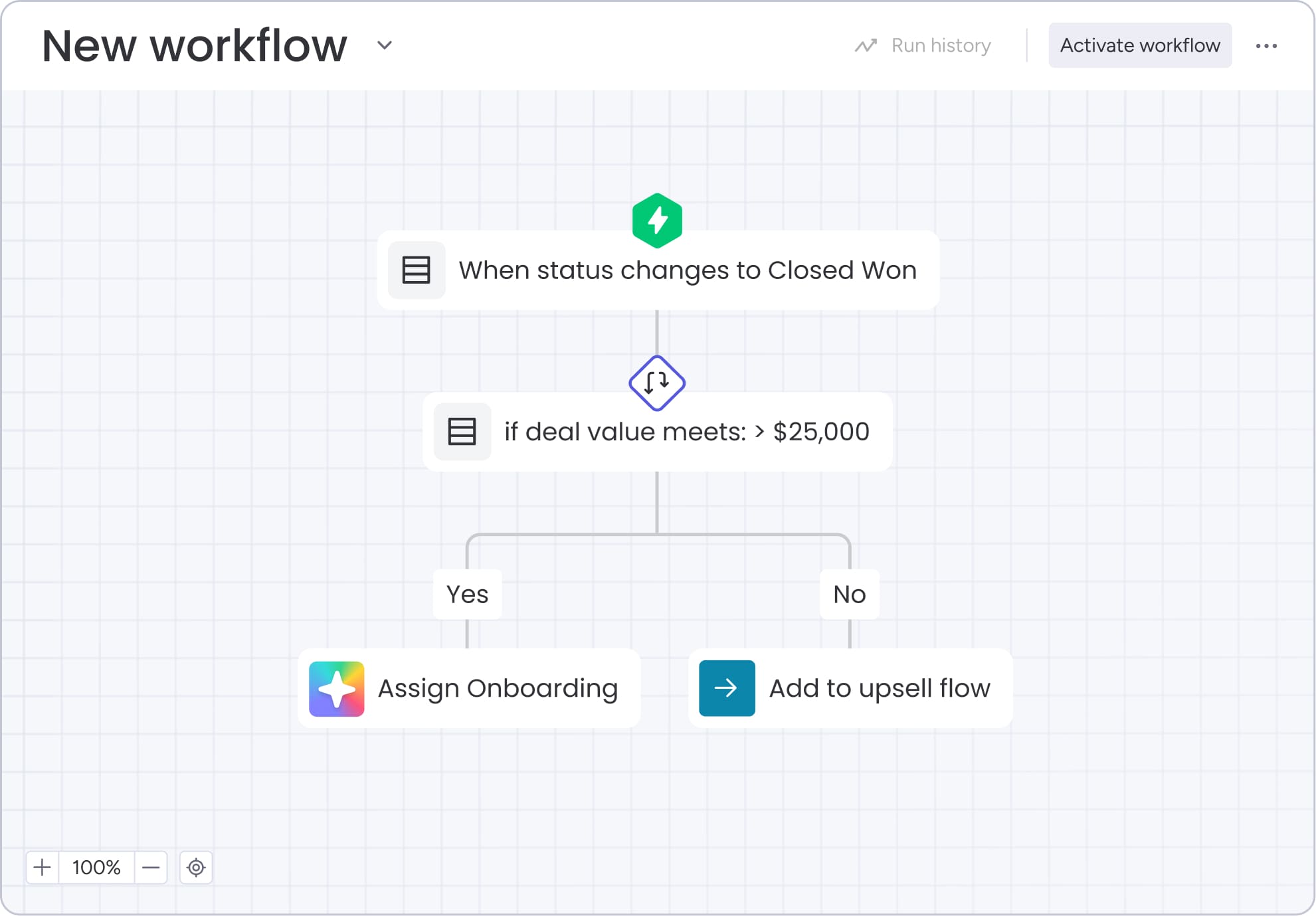
Lead management software vs CRM: which do you need
The debate over ‘lead management vs. CRM’ often misses the point. The real question: why choose one when you can have both?
A basic lead tool might work at first, but your team is built for growth. Outgrowing your tools creates data silos and slows you down right when you should be accelerating—forcing you to patch together systems instead of focusing on selling.
monday CRM combines powerful lead capture and automation with a complete view of the customer journey. One platform. Total visibility. Your team moves faster, stays aligned, and closes more deals with confidence.
Your platform should adapt to your winning process, not the other way around.

Why revenue teams choose monday CRM for lead management
Your team is drowning in CRM complexity when they should be closing deals. Too many platforms promise simplicity but deliver a tangled mess of features that slow your reps down instead of speeding them up. Your sales engine sputters when it should be firing on all cylinders.
monday CRM eliminates that friction. We built a platform that’s powerful enough to handle your entire lead management process, yet intuitive enough that your team will actually want to use it every day.
Here’s what sets us apart:
- One unified view: All lead data, communications, and activities live in a single workspace—no more jumping between tools or hunting for information.
- Automation that works in the background: Repetitive tasks like data entry, follow-up reminders, and lead routing happen automatically, freeing your reps to focus on selling.
- Complete customization without code: Adapt the platform to your unique sales process in minutes, not months, with our intuitive no-code builder.
- Real adoption, not forced compliance: When your team enjoys using their CRM, data quality improves, forecasting becomes accurate, and handoffs run smoothly.
The bottom line: monday CRM transforms your sales process from an administrative burden into your biggest competitive advantage.
FAQs about lead management software
What is the best lead management software for small businesses?
The best lead management software for small businesses is intuitive, customizable, and scalable. It should empower your reps to focus on selling, not on wrestling with complex configurations.
What is the difference between lead management software and CRM systems?
Lead management software focuses on capturing and converting new prospects, while a full CRM system manages the entire customer journey from first contact to long-term relationships.
How much does lead management software typically cost?
Costs vary from free plans to over $50 per user per month, depending on your team's size and the features you need. Many platforms offer tiered pricing so you only pay for what you use.
Can lead management software integrate with existing marketing platforms?
Yes, modern platforms are designed to connect seamlessly with your marketing tools, which automates lead flow and creates a single source of truth for your team.
How quickly can teams implement lead management software?
Implementation can take anywhere from a few hours to a few weeks, with intuitive, no-code platforms allowing teams to get set up and start selling on the same day.
Do lead management platforms work for B2B and B2C businesses?
Absolutely; the best platforms are flexible enough to be customized for both the longer, complex sales cycles of B2B and the faster, high-volume needs of B2C.


